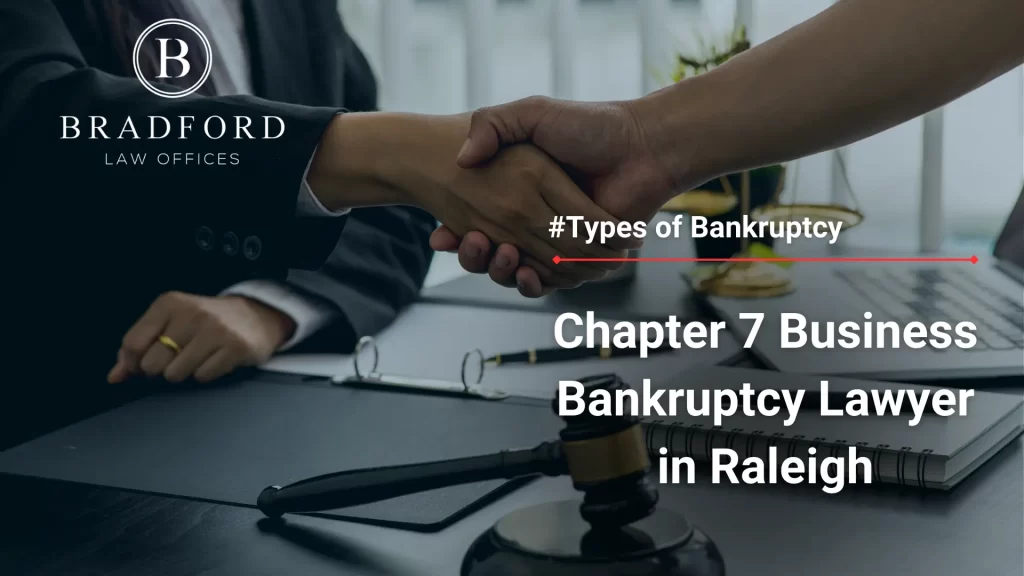
No matter the product, market, or state of the economy, starting a business is inherently risky. And while no business or entrepreneur sets out with the intention of one day running into financial turmoil or distress, the reality is it can happen to anyone; even the most well-run businesses. Facing financial anxiety and hardships can be incredibly stressful, leaving business owners in disarray and wondering what, if any, options are available to them. Fortunately, the Raleigh Chapter 7 business bankruptcy lawyers at the Bradford Law Offices are here to handle your debt and financial difficulty and lead you through this incredibly difficult and stressful time.
If your business is currently facing serious debt and financial difficulty, it’s important to know that you have options. For many companies, Chapter 7 bankruptcy can be a realistic and effective way to handle your financial problems, getting you out of debt and moving forward with your life. The qualified and professional Raleigh Chapter 7 bankruptcy lawyers at the Bradford Law Offices would love to meet with you and talk about your business and how we can help. Call us today at (919) 758-8879 and schedule a consultation.
Why Do I Need an Experienced Bankruptcy Attorney?
Like many types of law, bankruptcy law can be extremely complicated, nuanced, and involved. That’s why you need an experienced bankruptcy attorney to handle your case every step of the way. Not only do bankruptcy attorneys know everything about the complicated filing process, but they also are fluent in the steps necessary to discharge or eliminate as many outstanding debts as possible, freeing you to start rebuilding your life.
As you may know, Chapter 7 Bankruptcy isn’t the only form of bankruptcy, though it is often the most desirable form of bankruptcy because it means you can essentially shut down your business and erase your debt, so long as you do not have personal liabilities to the business. Even if you do have personal liabilities, these can likely also be absolved if you file for personal bankruptcy in addition to business bankruptcy. Depending on the situation, your creditors may or may not be paid back. Some creditors may have to absorb the loss.
There are a lot of contingencies associated with bankruptcy, especially when you’re applying for business bankruptcy. Bankruptcy law is so complicated that you are highly discouraged from representing yourself in court (if it is allowed at all). Having an experienced lawyer handle everything for you makes the process go much more smoothly. Business bankruptcy lawyers are incredibly well-versed in bankruptcy laws and litigation, so hiring one of these professionals will allow you to get through this stressful and complicated situation with as little confusion and personal loss as possible.
Read More: Benefits of Chapter 7 Bankruptcy
Why Choose The Bradford Law Offices?
 For more than 25 years we have dedicated our lives to helping businesses and individuals face financial hardships head on and come out on the other side with the best scenario possible. Our experienced bankruptcy attorneys take the time to get to know their clients and work with them closely every step of the way. Founder Danny Bradford has been serving the Raleigh community since establishing Bradford Law Offices in 1996, and he regularly practices in the area of bankruptcy, including Chapter 7 business bankruptcies. He genuinely wants to see every one of his clients get their lives back on track. Here at Bradford Law Offices, we believe everyone deserves a second chance to build a successful life for themselves, and, often, filing for Chapter 7 business bankruptcy is the best way to get a clean slate.
For more than 25 years we have dedicated our lives to helping businesses and individuals face financial hardships head on and come out on the other side with the best scenario possible. Our experienced bankruptcy attorneys take the time to get to know their clients and work with them closely every step of the way. Founder Danny Bradford has been serving the Raleigh community since establishing Bradford Law Offices in 1996, and he regularly practices in the area of bankruptcy, including Chapter 7 business bankruptcies. He genuinely wants to see every one of his clients get their lives back on track. Here at Bradford Law Offices, we believe everyone deserves a second chance to build a successful life for themselves, and, often, filing for Chapter 7 business bankruptcy is the best way to get a clean slate.
When it comes to your business and your finances, it’s imperative that you work with a bankruptcy attorney you trust completely. That’s why so many business owners have trusted our legal team over the years to handle their Chapter 7 business bankruptcy cases. We take the time to get to know you and your business because we truly care about our clients and want to see them get through this tough time with as little stress as possible.
What is Chapter 7 Bankruptcy for Businesses?
Chapter 7 bankruptcy is one of the most common forms of bankruptcy because it’s available for both individuals and businesses. Depending on your case, filing for Chapter 7 business bankruptcy can result in the discharge or elimination of many of your outstanding debts. In many cases, this means liquidating physical property by selling it at auction and combining accounts and assets that will be used to pay back creditors.
At Bradford Law, we work round the clock to make your filing process as smooth as possible, while also doing everything possible to protect your business. Typically, Chapter 7 business bankruptcy goes through the following steps:
- Evaluating the business: We look deeply at and evaluate all financial aspects of your business, including past troubles and future prospects.
- Evaluate all assets: After looking at the state of your business, we then list and analyze all assets of the business and decide which can be liquidated and which could be sold to creditors to work down your debt.
- Liquidation: The process of selling assets to creditors or at auction to work off large portions of your business’ debt.
- Stopping creditor harassment and moving forward: Filing for bankruptcy can prevent future harassment from creditors visiting or calling you at all hours of the day. We then create a feasible and responsible financial plan for the future so you can move on with your life and rebuild.
One point of confusion is how Chapter 7 bankruptcy for businesses differs from personal Chapter 7 bankruptcy. First, the exemptions that apply to personal bankruptcy claims (that sometimes allow individuals to maintain possession of some personal belongings) do not apply to business bankruptcies. In these cases, every asset of the business is liquidated. Additionally, if individual people are liable to the business, they must separately apply for personal bankruptcy or else they will be held responsible for the debts of the business. Lastly, there are sometimes extra costs for business bankruptcy filings because it is very rare that you will even be allowed to represent yourself without an attorney.
Every bankruptcy case is unique and while there may be some debts that aren’t eligible for discharge, working with an experienced and professional Chapter 7 business bankruptcy attorney gives you the best chance of eliminating almost all of your company’s debts. In some cases, filing for Chapter 7 bankruptcy allows business owners to discharge many of their debts, restructure their business, and come out on the other side stronger than before.
Dischargeable and Non-Dischargeable Debts
One misconception about bankruptcy is that all of your debts can be discharged or forgiven. Unfortunately, not every debt is dischargeable, therefore, requiring you to pay off certain remaining debts even after filing for bankruptcy. Depending on what type of bankruptcy you file, you may be more able to discharge certain debts. Under Chapter 7 bankruptcy, debtors are usually allowed to discharge a large amount of debt. Thus, as a debtor, it is important that you understand the difference between dischargeable and non-dischargeable debts so you can know what to expect when you file for bankruptcy.
What Debts are Dischargeable?
A dischargeable debt is one you are no longer responsible for paying after filing for bankruptcy. Some common examples of dischargeable debts include:
- Payments on motor vehicles
- Building payments
- Credit card debts
- Other debts related to your business
Along with dischargeable debts, there are also non-dischargeable debts that cannot be forgiven with bankruptcy. Some examples of non-dischargeable debts include student loans, child support, alimony, any debt owed to the government, and certain unpaid taxes.
Protecting Your Business
Many millions of people face financial difficulties at some point in their lives. Even businesses sometimes have to contend with financial distress. In many cases, especially recently, business owners have found comfort and relief through the bankruptcy process. Through bankruptcy, business owners can take steps to protect their businesses and perhaps prepare for a more successful commercial future.
Business Protection
Chapter 7 bankruptcy is one the most common forms of bankruptcy since it’s available to both individuals and businesses. When a business owner files for business bankruptcy, he or she likely wants to take steps to protect as many aspects of the business as possible. In general, business protection in bankruptcy functions through:
- Business evaluation – examining and evaluating financial aspects of a business and analyzing its business prospects for the future.
- Evaluation of assets – analyzing the assets of a business and evaluating which assets need to be liquidated and which cannot be liquidated to alleviate debts.
- Liquidation – through liquidation, some assets are sold to creditors to eliminate or reduce outstanding debts of the business.
- Ceasing creditor harassment – many business owners who have debt are harassed regularly by creditors, and bankruptcy can prevent this from happening.
- Creation of future plan – businesses have the opportunity to gain a deeper understanding of their finances and plan financially for the future.
Facing bankruptcy can be daunting for business owners, but protecting your business from financial strain through Chapter 7 bankruptcy can be vital.
Frequently Asked Questions
When you’re dealing with your business going bankrupt, the process can move much faster than anticipated or wanted. It’s for this reason that we’ve compiled some frequently asked questions that may apply to your case as well. If you do not find your question here, or your question is not completely answered, call us at (919) 758-8879 to discuss setting up a consultation.
Does filing for bankruptcy automatically mean you lose your business?
No matter how well you’ve tried to run your business, financial difficulties can happen. When exploring the possibility of filing for Chapter 7 business bankruptcy, it’s common to explore all necessary steps that protect as much of your business as possible while also forgiving insurmountable debts. In many cases, you can file for bankruptcy and protect your business for the future. That’s why you need an experienced attorney on your side.
Contact Us
Filing for Chapter 7 business bankruptcy can be an incredibly emotional experience. That’s why you need a professional, experienced, and poised bankruptcy attorney by your side every step of the way. At the Bradford Law Offices, the Raleigh Chapter 7 bankruptcy attorneys are here to explore your legal and financial options and help you move on from this stressful time in your life as easily as possible. Take the first step toward financial freedom by calling us today at (919) 758-8879 or reaching out to us online.